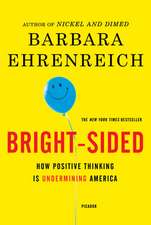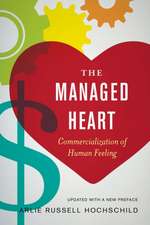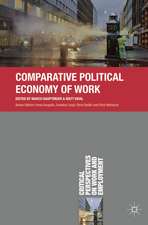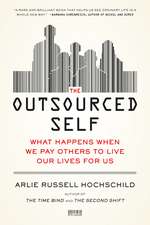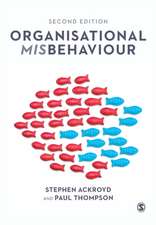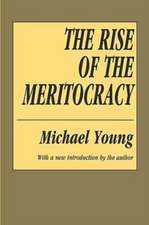An Analysis of Douglas McGregor's The Human Side of Enterprise: The Macat Library
Autor Stoyan Stoyanov, Monique Diderichen Limba Engleză Paperback – 15 iul 2017
Evaluation is all about judging the strength and weakness of positions: a critical evaluation asks how acceptable a line of reasoning is, how adequate, relevant and convincing the evidence is. McGregor sought to find out what makes a good manager by evaluating different management approaches, their assumptions about human behavior, and effects they had. In his view, management approaches could be roughly broken down into two "theories" Theory X, which held a negative idea of employee motivations; and Theory Y, which made positive assumptions about them. In McGregor's evaluation, Theory Y produced markedly better results in productivity and other measurable areas. On this basis, McGregor reasoned out a strong, persuasive argument for adopting Theory Y strategies on a grand scale.
| Toate formatele și edițiile | Preț | Express |
|---|---|---|
| Paperback (1) | 47.30 lei 22-36 zile | +4.95 lei 6-12 zile |
| Macat Library – 15 iul 2017 | 47.30 lei 22-36 zile | +4.95 lei 6-12 zile |
| Hardback (1) | 124.87 lei 43-57 zile | |
| Macat Library – 15 iul 2017 | 124.87 lei 43-57 zile |
Din seria The Macat Library
-
 Preț: 47.29 lei
Preț: 47.29 lei -
 Preț: 47.49 lei
Preț: 47.49 lei -
 Preț: 47.18 lei
Preț: 47.18 lei -
 Preț: 49.34 lei
Preț: 49.34 lei -
 Preț: 47.42 lei
Preț: 47.42 lei -
 Preț: 47.20 lei
Preț: 47.20 lei -
 Preț: 46.98 lei
Preț: 46.98 lei -
 Preț: 47.37 lei
Preț: 47.37 lei -
 Preț: 47.29 lei
Preț: 47.29 lei -
 Preț: 47.30 lei
Preț: 47.30 lei -
 Preț: 47.23 lei
Preț: 47.23 lei -
 Preț: 64.07 lei
Preț: 64.07 lei -
 Preț: 47.30 lei
Preț: 47.30 lei -
 Preț: 47.23 lei
Preț: 47.23 lei -
 Preț: 47.18 lei
Preț: 47.18 lei - 30%
 Preț: 32.99 lei
Preț: 32.99 lei -
 Preț: 47.13 lei
Preț: 47.13 lei -
 Preț: 47.23 lei
Preț: 47.23 lei -
 Preț: 47.26 lei
Preț: 47.26 lei -
 Preț: 47.65 lei
Preț: 47.65 lei -
 Preț: 47.37 lei
Preț: 47.37 lei -
 Preț: 47.08 lei
Preț: 47.08 lei -
 Preț: 47.18 lei
Preț: 47.18 lei -
 Preț: 47.18 lei
Preț: 47.18 lei -
 Preț: 47.27 lei
Preț: 47.27 lei -
 Preț: 47.99 lei
Preț: 47.99 lei -
 Preț: 47.23 lei
Preț: 47.23 lei -
 Preț: 47.02 lei
Preț: 47.02 lei -
 Preț: 47.23 lei
Preț: 47.23 lei -
 Preț: 47.42 lei
Preț: 47.42 lei -
 Preț: 47.30 lei
Preț: 47.30 lei -
 Preț: 47.13 lei
Preț: 47.13 lei -
 Preț: 47.10 lei
Preț: 47.10 lei -
 Preț: 47.20 lei
Preț: 47.20 lei -
 Preț: 46.98 lei
Preț: 46.98 lei -
 Preț: 47.08 lei
Preț: 47.08 lei -
 Preț: 47.29 lei
Preț: 47.29 lei -
 Preț: 47.15 lei
Preț: 47.15 lei -
 Preț: 47.29 lei
Preț: 47.29 lei -
 Preț: 64.24 lei
Preț: 64.24 lei -
 Preț: 46.98 lei
Preț: 46.98 lei -
 Preț: 47.40 lei
Preț: 47.40 lei -
 Preț: 47.87 lei
Preț: 47.87 lei -
 Preț: 47.42 lei
Preț: 47.42 lei -
 Preț: 47.18 lei
Preț: 47.18 lei -
 Preț: 47.40 lei
Preț: 47.40 lei -
 Preț: 47.40 lei
Preț: 47.40 lei -
 Preț: 46.98 lei
Preț: 46.98 lei -
 Preț: 47.20 lei
Preț: 47.20 lei -
 Preț: 47.21 lei
Preț: 47.21 lei
Preț: 47.30 lei
Nou
9.05€ • 9.42$ • 7.47£
Carte disponibilă
Livrare economică 24 martie-07 aprilie
Livrare express 08-14 martie pentru 14.94 lei
Specificații
ISBN-10: 1912128187
Pagini: 96
Dimensiuni: 129 x 198 x 12 mm
Greutate: 0.12 kg
Ediția:1
Editura: Macat Library
Colecția Macat Library
Seria The Macat Library
Cuprins
Notă biografică
Monique Diderich is a consultant at the National Foreign Language Center at the University of Maryland.
Descriere
What makes a good manager? Though we can probably all point to someone we think of as a good manager, what precisely makes them so good at their job is a complex question - and one central to good business organization. Management scholar Douglas McGregor's seminal 1960 book The Human Side of Enterprise is perhaps the most influential attempt to answer that question, and provides an excellent example of strong evaluative and reasoning skills in action.
Evaluation is all about judging the strength and weakness of positions: a critical evaluation asks how acceptable a line of reasoning is, how adequate, relevant and convincing the evidence is. McGregor sought to find out what makes a good manager by evaluating different management approaches, their assumptions about human behavior, and effects they had. In his view, management approaches could be roughly broken down into two "theories" Theory X, which held a negative idea of employee motivations; and Theory Y, which made positive assumptions about them. In McGregor's evaluation, Theory Y produced markedly better results in productivity and other measurable areas. On this basis, McGregor reasoned out a strong, persuasive argument for adopting Theory Y strategies on a grand scale.




